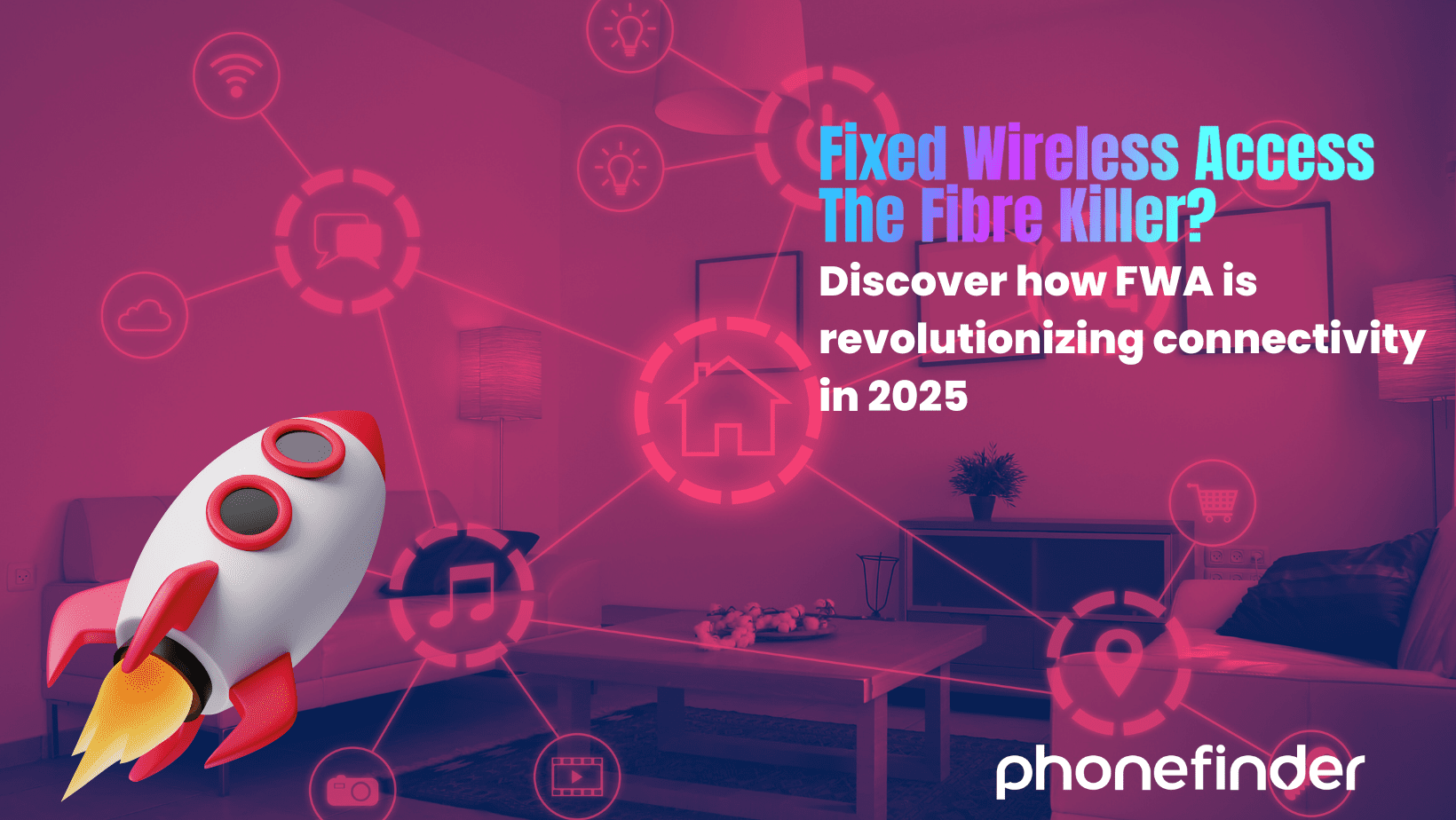Top Benefits and Trends of Fixed Wireless Access in South Africa
17 July 2025

Introduction to Fixed Wireless Access (FWA)
Fixed Wireless Access (FWA) is rapidly emerging as one of the most viable alternatives to traditional broadband in South Africa. Using radio signals from a base station to a fixed antenna at your location, FWA delivers high-speed internet without costly fibre cables. Unlike mobile internet, it’s designed for stationary use—homes, offices, schools—offering consistent performance where wired infrastructure is limited.
The Rise of FWA in South Africa
South Africa faces unique challenges in extending fibre deep into rural and peri-urban areas due to terrain, cost, and bureaucratic hurdles. These limitations have accelerated the demand for wireless solutions. FWA—especially its 4G and 5G variants—offers reliable speeds, faster deployment, and broader reach, making it an attractive option for bridging the digital divide post COVID-19.
Key FWA Providers in South Africa
- Rain: Early mover in home 4G/5G internet, known for budget-friendly plans.
- Telkom: Widely available LTE-based home broadband.
- Vodacom: Strong coverage in urban/suburban areas.
- MTN: Focused on reliability and competitive pricing.
How FWA Works
- Base Station: Positioned on a tower or rooftop.
- CPE Antenna: Fixed receiver mounted at your location.
- Router: Distributes Wi-Fi or LAN throughout the premises.
FWA uses licensed or unlicensed spectrum via line of sight and can now achieve speeds rivalling entry-level fibre across short distances.
Coverage and Reach Across Provinces
FWA providers have prioritized urban centres like Gauteng and Western Cape, but are expanding into Eastern Cape, KwaZulu-Natal, and Limpopo. Investment from both private companies and the government is helping broaden reach, particularly in remote communities.
Why Choose FWA Over Fibre Internet?
- Faster Installation: FWA is up and running in just 24–48 hours—no civil works needed.
- Lower Costs: Avoids expensive trenching and installation fees; equipment is often subsidized.
- Ideal for Underserved Areas: Wireless signal reaches homes where fibre never will.
- Portability: Easier to move if you rent or frequently relocate.
- Ample Speeds: With typical speeds between 20–100 Mbps, plus growing 5G deployment, it meets most household and business needs.
- Improving Reliability: 5G networks boost latency and bandwidth performance, making FWA a strong competitor to fixed-line services.
Benefits of Fixed Wireless Access
- Cost-efficiency: No cable infrastructure makes it more affordable.
- Rapid Deployment: Quick setup—perfect for temporary or emergency scenarios.
- Flexibility: Move within coverage zones with ease.
- Adequate Speeds: Ideal for streaming, video conferencing, online schoolwork, and general browsing.
Limitations of FWA in South Africa
- Signal Vulnerability: Trees and building structures can affect signal quality.
- Shared Throughput: Speeds may create bottlenecks during peak times.
- Latency Concerns: Not yet optimal for ultra-competitive gaming or industrial real-time applications.
Use Cases for FWA in South Africa
- Residential Access: Great for renters and families in non-fibre neighborhoods.
- Small to Medium Businesses: Enables fast, low cost connectivity without fibre.
- Education & Remote Work: Vital for e-learning and work-from-home setups.
- Temporary Installations: Useful for events, construction sites, or pop-up shops.
Impact on Education and E-Learning
FWA is unlocking possibilities for rural learners by enabling digital classrooms, teacher webinars, and remote exams. As fibre rollout remains limited in rural schools, FWA offers a practical, cost-effective alternative to boost educational outcomes.
5G and the Future of FWA in South Africa
South Africa’s shift from 4G to 5G for FWA is raising speeds, reducing latency, and increasing network efficiency. As spectrum availability expands and densification grows, FWA promises even more compelling performance—making gigabit-class wireless a real possibility.
Environmental Impact of FWA
With fewer cables to lay and less groundwork disturbance, FWA has a lighter ecological footprint. Many providers are investing in green energy and energy-efficient tower designs to minimize environmental impact.
Cost Comparison: FWA vs Fibre
| Aspect | FWA | Fibre |
|---|---|---|
| Installation Fee | Typically, low to zero | High, including trenching and labor |
| Monthly Price | Medium range (~R400–R800) | Varies, often higher for high-speed plans |
| Equipment Cost | Often included or leased | Purchased upfront or provider-provided |
| Long-term Affordability | Competitive for 50–100 Mbps tier | Higher tiers required for premium speeds |
Customer Reviews and Satisfaction
Many users praise FWA for its fast setup and reliable daily performance. A typical review highlights: “I was connected in two days without drilling or cables—perfect for renters.” Some users note slight speed dips during evening hours, especially in dense suburban zones.
Choosing the Right FWA Plan in South Africa
- Coverage Strength: Check line-of-sight and signal strength at your address.
- Speed vs Budget: Do you need basic (20–50 Mbps) or premium (>50 Mbps) speeds?
- Package Extras: Look for inclusive data, no-installer deals, or router upgrades.
- Provider Support: See if they offer 24/7 service and remote diagnostics.
Frequently Asked Questions (FAQs)
- What is Fixed Wireless Access South Africa? FWA uses radio links instead of cables to deliver broadband to fixed locations across South Africa.
- Can FWA match fibre speeds? Yes, many FWA plans now range from 20 to 100 Mbps and can rival entry level fibre. 5G-based FWA can surpass these speeds under optimal conditions.
- Is FWA reliable during heavy rain? Modern FWA is mostly unaffected by rain, though heavy storms can cause occasional slowdowns.
- Do I need line-of-sight for FWA? Ideally, yes. A clear path between your antenna and the provider’s tower ensures the best performance.
- Can I use FWA if I move? Usually you can—as long as the new address is within the same provider’s coverage zone and the signal is strong.
- Is FWA more expensive than LTE mobile data? FWA generally offers better value for fixed-use users than capped mobile LTE plans.
Conclusion
As of mid 2025, Fixed Wireless Access South Africa is carving out a strong niche—offering fast, affordable, and accessible broadband where fibre remains impractical. With rapid deployment, expanding 5G support, and widespread coverage, FWA is proving to be a robust alternative that connects rural schools, urban homes, and businesses alike. For many South Africans, it’s no longer a backup plan—it’s the better plan.
Looking for connectivity deals? Phonefinder offers hundreds of affordable smartphone contracts across MTN, Vodacom, Cell C, and Telkom—ideal for households needing fast, reliable, no-fibre access. For full mobile and home coverage, consider bundling a Phonefinder smartphone plan with an ISP's FWA package.


